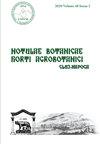Processing waste: bioactive components and antioxidant capacity of cold-pressed oils from some fruit seeds
IF 1.3
4区 生物学
Q3 PLANT SCIENCES
引用次数: 0
Abstract
In this study, the possible use of seeds after fruit processing to obtain unconventional cold-pressed edible oil was investigated. For this purpose, seeds of quince, sour cherries and plum were used. Fatty acid composition, antioxidant activity, peroxide and acid value, oxidative stability, and tocopherols and phytosterols content were determined in the studied oils. Plum seed oil was dominated by oleic acid, while quince and sour cherry seed oils contained abundant linoleic acid. The total polyphenol content in the studied oils ranged from 2.28 to 9.03 mg GAE 100 mL-1. Antioxidant properties (ABTS, DPPH, FRP) were associated with tocopherol content. All three studied oils were rich in β-sitosterol. The oxidative stability of the studied oil samples varied and ranged from 1.92 h-31.17 h. Quince seed oil had the highest content of α-tocopherol (44.30 mg 100 g-1) and plum seed oil had the lowest (3 mg 100 g-1), while sour cherry seed oil had the highest content of β+γ-tocopherol (17.19 mg 100 g-1). The results show that oil from quince, sour cherry, and plum seeds is suitable for the production of a high quality cold-pressed oil. The use of this type of waste from fruit processing contributes to waste reduction and promotes the circular economy.加工废料:某些水果种子冷榨油的生物活性成分和抗氧化能力
在本研究中,探讨了利用水果加工后的种子获得非常规冷榨食用油的可能性。为此,使用了榅桲、酸樱桃和李子的种子。测定了所研究油脂的脂肪酸组成、抗氧化活性、过氧化值和酸值、氧化稳定性以及生育酚和植物甾醇含量。李子籽油以油酸为主,而榅桲籽油和酸樱桃籽油则含有丰富的亚油酸。研究油中总多酚含量为2.28 ~ 9.03 mg GAE 100 mL-1。抗氧化性能(ABTS, DPPH, FRP)与生育酚含量有关。所有三种被研究的油都富含β-谷甾醇。油品的氧化稳定性为1.92 ~ 31.17 h,其中α-生育酚含量最高的是木瓜籽油(44.30 mg 100 g-1),最低的是李子籽油(3 mg 100 g-1),酸樱桃籽油中β+γ-生育酚含量最高(17.19 mg 100 g-1)。结果表明,以榅桲籽、酸樱桃籽和李子籽为原料的油适合制作高品质的冷榨油。利用水果加工过程中产生的这类废物有助于减少废物,促进循环经济。
本文章由计算机程序翻译,如有差异,请以英文原文为准。
求助全文
约1分钟内获得全文
求助全文
来源期刊

Notulae Botanicae Horti Agrobotanici Cluj-napoca
PLANT SCIENCES-
CiteScore
2.70
自引率
0.00%
发文量
118
审稿时长
3 months
期刊介绍:
Notulae Botanicae Horti Agrobotanici Cluj-Napoca is a peer-reviewed biannual journal aimed at disseminating significant research and original papers, critical reviews and short reviews. The subjects refer on plant biodiversity, genetics and plant breeding, development of new methodologies that can be of interest to a wide audience of plant scientists in all areas of plant biology, agriculture, horticulture and forestry. The journal encourages authors to frame their research questions and discuss their results in terms of the major questions of plant sciences, thereby maximizing the impact and value of their research, and thus in favor of spreading their studies outcome. The papers must be of potential interest to a significant number of scientists and, if specific to a local situation, must be relevant to a wide body of knowledge in life sciences. Articles should make a significant contribution to the advancement of knowledge or toward a better understanding of existing biological and agricultural concepts. An international Editorial Board advises the journal. The total content of the journal may be used for educational, non-profit purposes without regard to copyright. The distribution of the material is encouraged with the condition that the authors and the source (Notulae Botanicae Horti Agrobotanici Cluj-Napoca or JCR abbrev. title Not Bot Horti Agrobo) are mentioned.
 求助内容:
求助内容: 应助结果提醒方式:
应助结果提醒方式:


